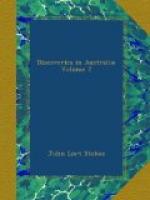TREATMENT OF NATIVES.
Their destiny is accomplished. In obedience to a necessity—of man’s creating certainly, but still a necessity—they have been expatriated for their own preservation; to restore them, would be but to ensure their speedier destruction; and all we can do is to soothe their declining years, to provide that they shall advance gently, surrounded by all the comforts of civilization, and by all the consolations of religion, to their inevitable doom; and to draw a great lesson from their melancholy history, namely, that we should not leave, until it is too late, the aborigines of the countries we colonize exposed to the dangers of an unregulated intercourse with the whites; that, without giving them any undue preference, without falling into the dangerous extreme of favouritism—an error of which the most high-minded and generous are susceptible in the case of a depressed race—we should consider, that in entering their country we incur a great responsibility, and that it behoves us at once to establish distinctly the relation in which they stand to the government, the colonists, and the soil!
COAST FROM THE TAMAR TO EMU BAY.
Mr. Fitzmaurice’s examination of the coast to the westward extended to Dial Point, distant twenty-nine miles from the Tamar. In this space there are no less than five rivers, all with very short courses, and not navigable except by boats and small craft; and by these only, on account of the surf on their bars, in fine weather. The first empties itself into an estuary, called Port Sorel; but it is difficult to detect the mouths of the others in the low sandy shore, which is deceptive, as the hills rising immediately in the rear give the coast a bold striking appearance from the offing. These rivers, namely, the Sorel, the Mersey,* the Don, the Frith, and the Leven, are distant from the Tamar, eleven, eighteen, twenty, twenty-three and twenty-seven miles.




